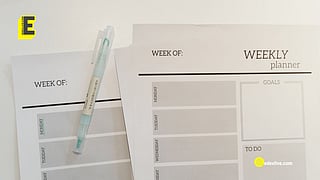
Crafting an effective timetable requires a personalised approach, and EdexLive explored this by delving into the routines of individuals like IAS officer Manuj Jindal and the world's fastest calculator, Bhanu Prakash. Each perspective sheds light on the layers of mastering time.
“Embrace mornings," insists Manuj Jindal, emphasising the productivity boost that aligning with the natural cycle can bring. He shares, "It may be a debated notion, but I firmly believe that aligning with the natural cycle of most animals enhances productivity. After lunch, one can take it easy and still have ample time for other activities.”
However, balancing work and leisure is crucial in schedule-building, as highlighted by Khushi Jain, a Class X student of Sushila Birla Girls’ School, Kolkata. She says, "Don't forget to have fun while working. Take breaks when needed and prioritise high-priority tasks. Don’t cut out time with family and friends, as it also contributes to personal development."
Again, room for flexibility in timetables and personalising it to one's own needs is imperative. “I like to keep it flexible. It's about having a plan but tweaking it as needed,” adds Sai Sharan, Class X student, Gitanjali Senior School, Hyderabad.
On a similar note, young prodigy Agastya Jaiswal, who completed his postgraduation at the age of 16, brings in a unique analogy. He states, "Life is an exam and everyone has different question papers. Hence, to share my opinion on an ideal timetable might prove futile for someone else."
Agastya shares that he too embraces early mornings and wakes up at 6 am, indulging in physical and philanthropic activities. “Between 1 to 3 pm, I teach kids. It is my way of giving back what I have learnt, indulging in acts of philanthropy.” He advises students against using cell phones stating, “Limiting internet and cellphone use can save a lot of your time.”
- 6.30 am - 7.30 am: Wake up and morning routine.
- 7.30 am - 8.00 am: Energising morning exercise.
- 8.00 am - 9.00 am: Breakfast and quick review of daily goals.
- 9.00 am - 12.00 pm: Morning study session, revise everything you did the previous day in brief
9.00 am - 10.30 am: Active learning session (example, solving problems, flashcards)
10.30 am - 11.00 am: Break - grab a snack and relax
11.00 am - 12.00 pm: Study session
- 12.00 PM - 1.30 PM: Lunch and social time (connect with friends or family)
- 1.30 pm - 4.30 pm: Afternoon study session: (use techniques like mind mapping and learn new concepts)
1.30 pm - 3.00 pm: Focus on a challenging subject or project
3.00 pm - 3.30 pm: Break, take a short walk or listen to music
3.30 pm - 4.30 pm: Collaborative learning session (study group or online discussion)
- 4:30 PM - 5:30 PM: Creative break: Pursue a hobby, artistic activity, or engage in a creative project.
- 5.30 pm - 7.00 pm: Evening study session:
5.30 pm - 6.30 pm: Review and revise what was studied during the day.
6.30 pm - 7.00 pm: Plan for the next day and set go
(Pic: EdexLive Desk)7.00 pm - 8.00 pm: Dinner and relaxation
8.00 pm - 9.30 pm: Leisure and entertainment: Watch a documentary, read a non-academic book, or engage in a favourite pastime
9.30 pm - 10.30 pm: Night routine: Wind down and set up the next day's study materials
10.30 pm: Bedtime
